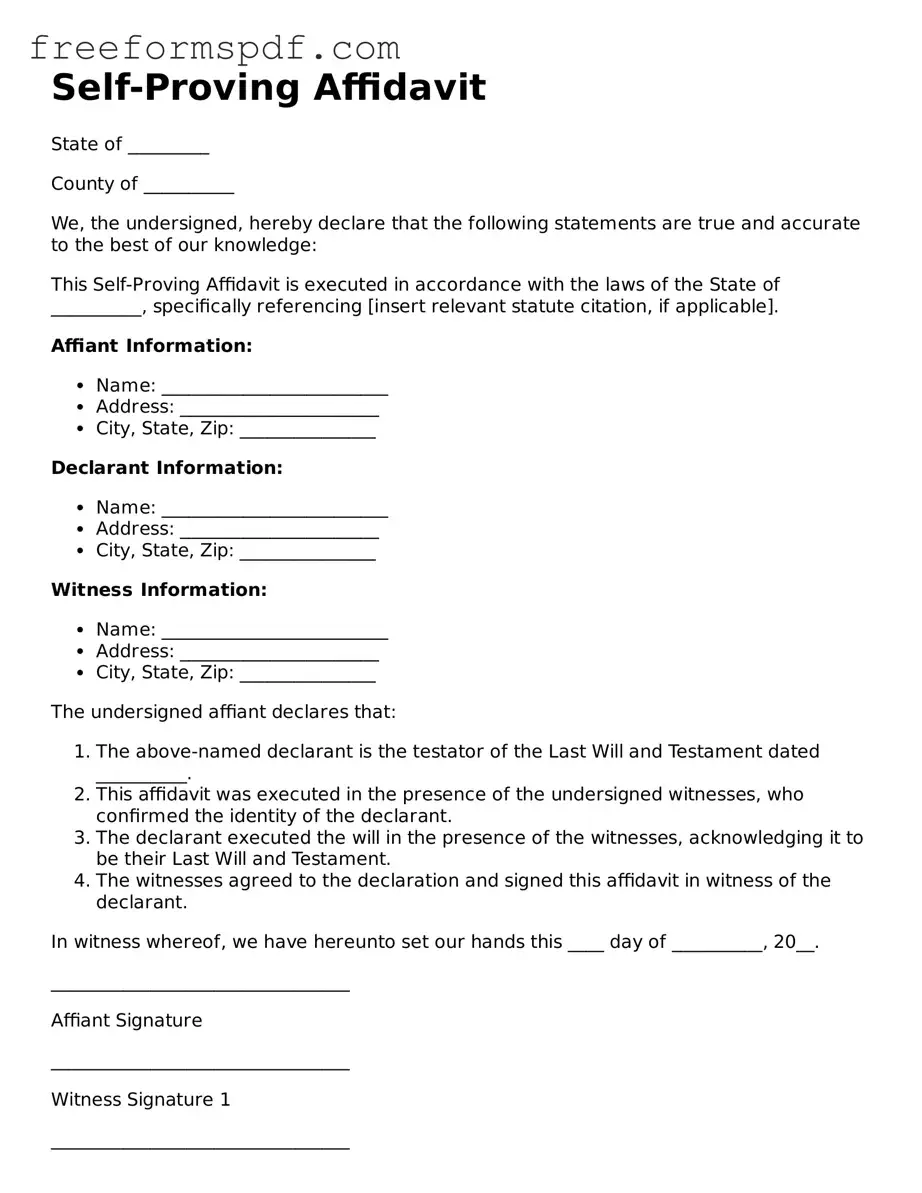Self-Proving Affidavit Document
Common mistakes
-
Inaccurate Information: Providing incorrect details about the testator or witnesses can invalidate the affidavit. Double-check names, addresses, and dates.
-
Missing Signatures: Both the testator and witnesses must sign the affidavit. Omitting one or both signatures can lead to complications.
-
Notary Public Errors: The notary must properly complete their section. Failing to include the notary’s signature or seal can render the document ineffective.
-
Improper Witnesses: Witnesses must meet specific criteria. Using individuals who are beneficiaries or related to the testator can create conflicts.
-
Neglecting to Date: Forgetting to include the date of signing can lead to disputes about the validity of the document.
-
Using Outdated Forms: Laws change, and so do forms. Ensure you are using the most current version of the Self-Proving Affidavit.
-
Not Reading Instructions: Many people skip the instructions. Reading them carefully can prevent many common mistakes.
-
Assuming the Affidavit is Optional: Some believe the Self-Proving Affidavit is not necessary. However, it can simplify the probate process significantly.
-
Failing to Keep Copies: After completing the affidavit, it’s important to keep copies. Not having a record can lead to confusion later.
Learn More on This Form
-
What is a Self-Proving Affidavit?
A Self-Proving Affidavit is a legal document that accompanies a will. It serves to validate the will by confirming that the testator (the person who created the will) signed it in the presence of witnesses. This affidavit can help simplify the probate process, as it allows the will to be accepted without requiring witnesses to testify in court.
-
Why should I use a Self-Proving Affidavit?
Using a Self-Proving Affidavit can streamline the probate process for your loved ones. When a will is self-proving, it reduces the likelihood of disputes over its validity. Additionally, it saves time and resources, as the court may not need to summon witnesses to confirm the will's authenticity. This can provide peace of mind for both the testator and the beneficiaries.
-
How do I create a Self-Proving Affidavit?
To create a Self-Proving Affidavit, the testator must sign the will in front of at least two witnesses. After the will is signed, the witnesses also need to sign the affidavit, confirming that they witnessed the testator's signature. It is important to follow state-specific requirements, as some jurisdictions may have additional rules regarding the format and content of the affidavit.
-
Is a Self-Proving Affidavit necessary for my will?
While a Self-Proving Affidavit is not strictly necessary for a will to be valid, it is highly recommended. Without it, the probate court may require witnesses to testify, which can complicate and prolong the process. Including a Self-Proving Affidavit can ease the burden on your loved ones during a difficult time, ensuring that your wishes are honored without unnecessary delays.
Misconceptions
The Self-Proving Affidavit is an important legal document that can simplify the probate process for a will. However, several misconceptions exist about this form that can lead to confusion. Here are five common misconceptions:
- It is only for wealthy individuals. Many people believe that only those with significant assets need a Self-Proving Affidavit. In reality, anyone who wants to ensure their will is accepted without the need for witnesses during probate can benefit from this document.
- It replaces the need for witnesses. Some think that a Self-Proving Affidavit eliminates the need for witnesses altogether. While it does simplify the process, witnesses are still required when the will is initially signed.
- It can be created at any time. There is a misconception that a Self-Proving Affidavit can be completed after the will has been executed. In fact, it must be signed by the testator and witnesses at the same time as the will to be valid.
- It is only necessary in certain states. Some individuals believe that this form is not needed unless they live in specific states. However, many states recognize the Self-Proving Affidavit, and it can be beneficial regardless of location.
- It guarantees the will's validity. A Self-Proving Affidavit does not guarantee that the will is valid. It simply helps streamline the process by providing evidence of proper execution, but the will still must meet all legal requirements.
Understanding these misconceptions can help individuals make informed decisions about their estate planning and ensure their wishes are honored after their passing.
Other Types of Self-Proving Affidavit Forms:
Affidavit of Affixture Form - Required for financing or refinance loans involving the property.
Affidavit of Identity Form Pdf - An affidavit used to confirm an individual's identity in various legal situations.
For landlords and tenants alike, it is important to familiarize themselves with the nuances of the eviction process, particularly when it comes to the New York Notice to Quit form, which serves as a crucial component in formally notifying tenants to leave the rental property. Resources that provide further information, such as NY Templates, can be incredibly helpful in understanding how to navigate these situations effectively.
What Is Joint Tenancy in California - It can serve as a supplemental document for estate inventories.
